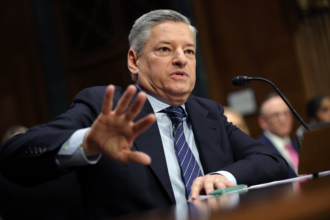Ford Motor said Wednesday that US tariffs on imported vehicles, as well as materials like steel and aluminum, will likely cost more than expected for the year, and the automaker’s shares slid about 3% in after-market trading.
Ford reported that second-quarter results took an $800 million hit from tariffs, a less pronounced impact than some of its US rivals thanks to Ford’s strong domestic manufacturing base. For the full year, the automaker lifted the higher range of its projected hit to gross revenues from tariffs by $500 million, to $3 billion.
Ford CEO Jim Farley said the company is in daily contact with the White House, with an ultimate goal of reducing its tariff costs, especially on parts tariffs. “We see there’s a lot of upside depending on how the negotiation goes with the administration,” Farley said.
Chief Financial Officer Sherry House said Ford raised the projection because duties on Mexico and Canada have remained higher for longer than expected. She also cited elevated levies on aluminum and steel.
The Dearborn, Mich., automaker also issued guidance for annual results on Wednesday, after suspending it in May to assess the impact of President Trump’s tariffs.
Ford said it now plans to record full-year adjusted earnings before interest and taxes of $6.5 billion to $7.5 billion, down from its February 2025 projection of between $7.0 billion and $8.5 billion.
For the latest quarter, the auto giant reported a 21% decrease in earnings per share to 37 cents, beating LSEG analysts’ expectation of 33 cents. Ford recorded a net loss for the quarter of $36 million, which it said was primarily due to special charges related to cancellation of a three-row electric SUV, and field service actions from a $570 million recall.
Ford posted revenue of $50.2 billion for the quarter, up 5% from a year earlier. The automaker has clawed away market share from rivals with aggressive discounting programs and a “zero, zero, zero” campaign, which offers shoppers a $0 down payment, zero percent interest for 48 months, and zero payments for the first 90 days on most vehicles.
“The substantial revenue outperformance demonstrates Ford’s pricing power, but margin compression suggests underlying cost pressures remain problematic,” CFRA Research analyst Garrett Nelson said in a note.
Gasoline-powered vehicles notched a 15.5% increase in the quarter on the back of these deals. Hybrid offers were also popular with shoppers in the quarter.
Ford said results for the quarter ending in June were $800 million lower because of Washington’s tariffs. Competitor General Motors reported steeper tariff headwinds, with a $1.1 billion hit for the quarter, largely from imports on its entry-level Chevrolet and Buick models made in South Korea.
GM has projected a $4 billion to $5 billion tariff impact for the year, with plans to offset 30% of that expense. Ford has said it expects to offset $1 billion of its gross tariff costs.
Jeep-maker Stellantis said tariffs were expected to add $1.7 billion in expenses for the year.
The White House did not reply to an email requesting comment on the automakers’ projections. In the past, Trump has said the levies will bring manufacturing power and jobs back to the US
Ford boasts domestic production for around 80% of the vehicles it sells in the US, about 25% more than its two Detroit rivals, according to business analytics firm GlobalData’s review of last year’s imports.
While this foundation has made it more resilient to tariffs, it still faces steep levies on aluminum, steel and copper that have rocked the industry. Additionally, executives have said that a pinched supply of rare earth magnets from China has disrupted production this quarter.
Ford’s EV investments and quality problems remained among its greatest challenges. Before tariffs hit, the automaker earlier this year said it expected to lose up to $5.5 billion on its EV and software business in 2025. It recorded a $1.3 billion operating loss on this segment for the quarter. Elimination of a $7,500 consumer tax credit in September is expected to additionally dampen EV sales growth.
The automaker is also battling costly quality issues and an industry-topping volume of recalls. Reducing these problems has been a priority for Jim Farley since he took on the role in 2020.










